Democrats Set Debate Schedule
While Republicans prepare for their first Presidential debate today, the Democrats have released their own debate schedule:
Democrats have got themselves a primary.
The first debate for the Democratic Party’s 2016 presidential contenders will take place October 13 in Nevada and be hosted by CNN, the Democratic National Committee announced Thursday, just hours before Republican hopefuls face off on stage for the first time in Cleveland.
The announcement ends weeks of speculation about the schedule, but it is unlikely to stop the grumbling from some Democratic White House aspirants; it took just minutes for one campaign to blast out a press release expressing irritation.
A total of six debates are scheduled, with six different sponsors: Oct. 13 in Nevada (hosted by CNN); Nov. 14 in Des Moines, Iowa (CBS/KCCI and The Des Moines Register); Dec. 19 in Manchester, New Hampshire (ABC/WMUR); Jan. 17 in Charleston, South Carolina (NBC/Congressional Black Caucus Institute); and two scheduled for either February or March in Miami, Florida, and Wisconsin, hosted by Univision/The Washington Post and PBS, respectively. The DNC said it would release additional details about debate dates, locations and partnerships soon.
(…)
The DNC said on Thursday that to qualify for a debate, candidates must get at least 1 percent in three credible national polls within the six weeks before the debate — a threshold that could make Webb, Chafee, and O’Malley’s camps nervous.
Campaigns started griping about the plan soon after the party committee announced it three months ago — the Sanders and O’Malley camps publicly said they wanted more than six debates, while Clinton’s team initially lobbied for even fewer.
In the intervening months, some of the complaints burst into the open. The Clinton camp has stayed quiet, but Sanders sent a letter to Wasserman Schultz in June asking for more events, sooner — including some that involve Republicans — and O’Malley railed against the process while campaigning in Iowa on Wednesday.
“To those in Washington who think they can limit the number of debates that we’re going to have before the Iowa caucuses, can circle the wagons and close off debates: I think they’re going to have another thing coming when they talk to the people of Iowa,” the Marylander said in Cedar Rapids, telling The Hill newspaper that he had personally complained to Wasserman Schultz last week.
O’Malley’s campaign went further on Thursday morning, when chief strategist Bill Hyers circulated a statement accusing the DNC of making the process “less democratic” by limiting the number of debates. The campaign then sent out a fundraising email to its supporters carrying a similar message within minutes.
A few hours later, Sanders chimed in: “I am disappointed, but not surprised, by the debate schedule announced by the Democratic National Committee,” he said. “At a time when many Americans are demoralized about politics and have given up on the political process, I think it’s imperative that we have as many debates as possible — certainly more than six.”
Webb’s team, meanwhile, told POLITICO that it wanted more debates in Iowa and New Hampshire.
“All we know is we will show up for as many debates as they want to do,” spokesman Craig Crawford said on Wednesday.
O’Malley, Sanders, and Webb, obviously, would prefer more debates so that they get more free media time and, potentially, more time to force Clinton into making a mistake that damages her campaign in some way. While that seems unlikely, it’s a perfectly natural strategy for candidates to follow. As for the merits of their charges, though, I’m not sure I see the problem here. Six debates, each of which is likely to be either 90 minutes or two hours long, among five candidates seems to be more than enough time for all parties concerned. The Republicans have more than three times as many declared candidates as the Democrats, and they are having nine debates over the same amount of time. Arguably, then, the Democratic schedule is being slightly more fair to the candidates at the back of the pack.

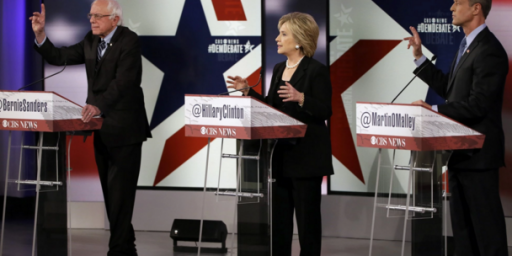
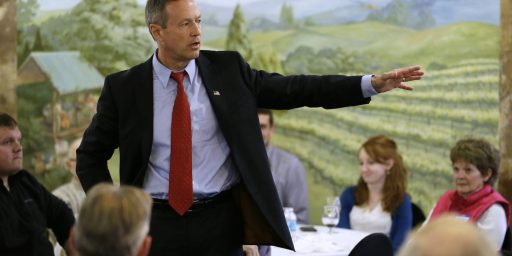
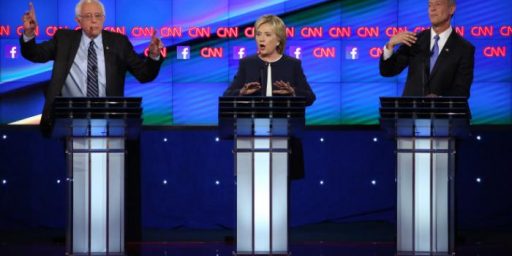
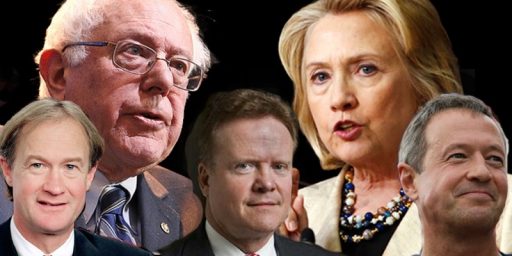
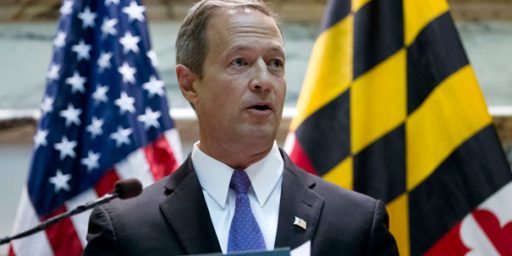
I noticed Fox News isn’t on the list if sponsoring organizations.
“The DNC said on Thursday that to qualify for a debate, candidates must get at least 1 percent in three credible national polls within the six weeks before the debate — a threshold that could make Webb, Chafee, and O’Malley’s camps nervous.”
If they are not getting at least 1% in 3 national polls over the prior 6 weeks, whether or not they are on the debate platform is not their largest concern.